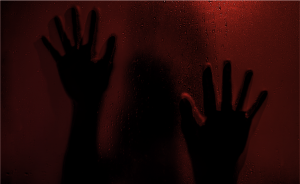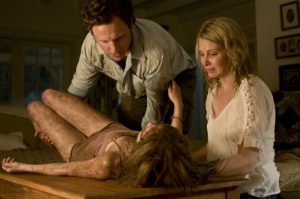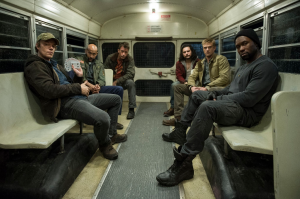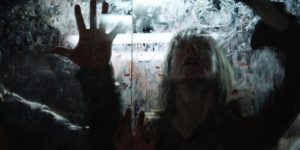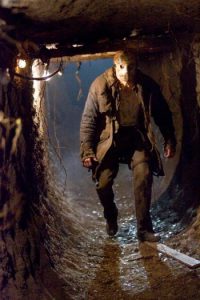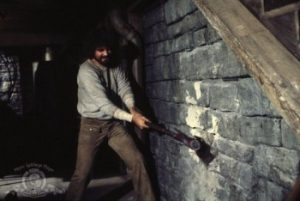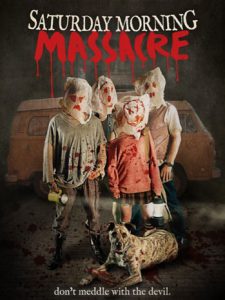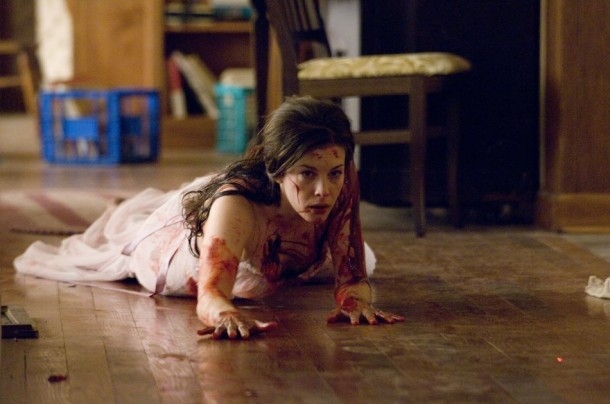
Home Invasion Films Get Us Where We Live
The recent string of home invasion films like The Strangers, Them and Inside got me thinking about the terror behind it all. Of course they each have their own brand of psychological teasers that touch different people in different ways, but the basic idea is the same. Your haven is no longer a place of comfort and security. And we, as humans, require security in all aspects of our lives. Perhaps nothing is more threatening than the notion that we are not safe, even within our own domiciles.
It begins in the womb. Surrounded by Mother’s warm body, sustained in nourishing fluids, we are never more secure than before we are born. Of course we don’t recall the trauma of birth but one can easily imagine how jarring it must be to be unceremoniously ripped from soothing darkness and thrust into the cold, bright harshness of life. That would be our first encounter with a loss of comfort, but that is soon forgotten as Mother holds us in loving arms and convinces us that all is well.

Then onto childhood and the quiet beneath the safety of the blankets. Somehow those layers of linen and flannel protect us from the dangers that lurk just beyond the line of light. If we failed in our diligence to close the closet door or absently laid a limb over the side of the bed, there is no need to be concerned if we can pull ourselves under the bedspread before the monster springs. We build our very own fortress that could certainly not keep any real specters at bay, but make us feel the comfort again that we lost those years ago. It even bleeds into our childhood games. Examples from Hide and Seek to board games like Sorry and Aggravation portray the safety zone as “Home” or “Home Base.”
As children we take security for granted, believing (because we have no reason not to) that we are protected in the presence or our caretakers. We are assured that no harm can befall us when we are among adults, particularly at home. Little do we know exactly what is involved in creating that bubble. As adults we learn that the creature comforts come with a price and that it takes hard work to keep them going. We become aware that there are physical dangers on the outside that must not be let inside. We lock our doors and “charlie-bar” our windows in every attempt to maintain the peace of mind we have at home.
But sometimes, locks and bars are not enough. There are those demons who will break through those carefully drawn barriers to attack us in the dead of night when our defenses are the weakest. There are those phantoms that stroll the paths between twilight and dawn, hiding among the shadows, waiting for the moment to pounce. Unfortunately our bed covers will not assuage those fears for once that shell has been breached, there is nowhere to run. If home is compromised, then there is no retreat.

Enter the home invasion film. It is aware that we are making our last stand. It knows that if we cannot survive on our own turf then we are surely doomed. And that realization strikes boldly to shatter any sense of relief we have managed to clutch in the darkness. It starts with a pounding at the door. Cue strains of the Terry Gibb song “Somebody’s Knocking.” Some unrecognized menace is using its power to manipulate the boundaries. But as long as the defenses hold, there is nothing to fear. Next is the shattering of glass or the creaking of an unopened outside door. The heart stops momentarily and our minds thrash about desperately to convince us that it is merely the wind or the settling of the house.
But when all the possibilities that we deem acceptable are stripped away, we are left with the facts. Someone has come into our home. The facade is torn away and we are bare. We are vulnerable. The best case scenario? We awaken to sheets bathed in sweat and entangled around our legs to find that the intruder was only a invention of our nightmares. The worst? It’s best we don’t talk about that.
The fact is that it doesn’t have to be anything at all to get our blood pumping and our adrenaline racing. Once we have reached that bleak destination, the hearth ruled by fear, we are at its mercy. And fear rarely shows remorse for the damage it has caused. We are now awake in the wee hours listening rigidly to every tree scraping the shutters or every sigh of the wind. The walls that once made us feel as if we were untouchable to the cruelties outside have betrayed us and the vestiges of asylum that we cherished have vanished. We are reduced to a quivering child hiding beneath the blankets once more.
The film is triumphant.



